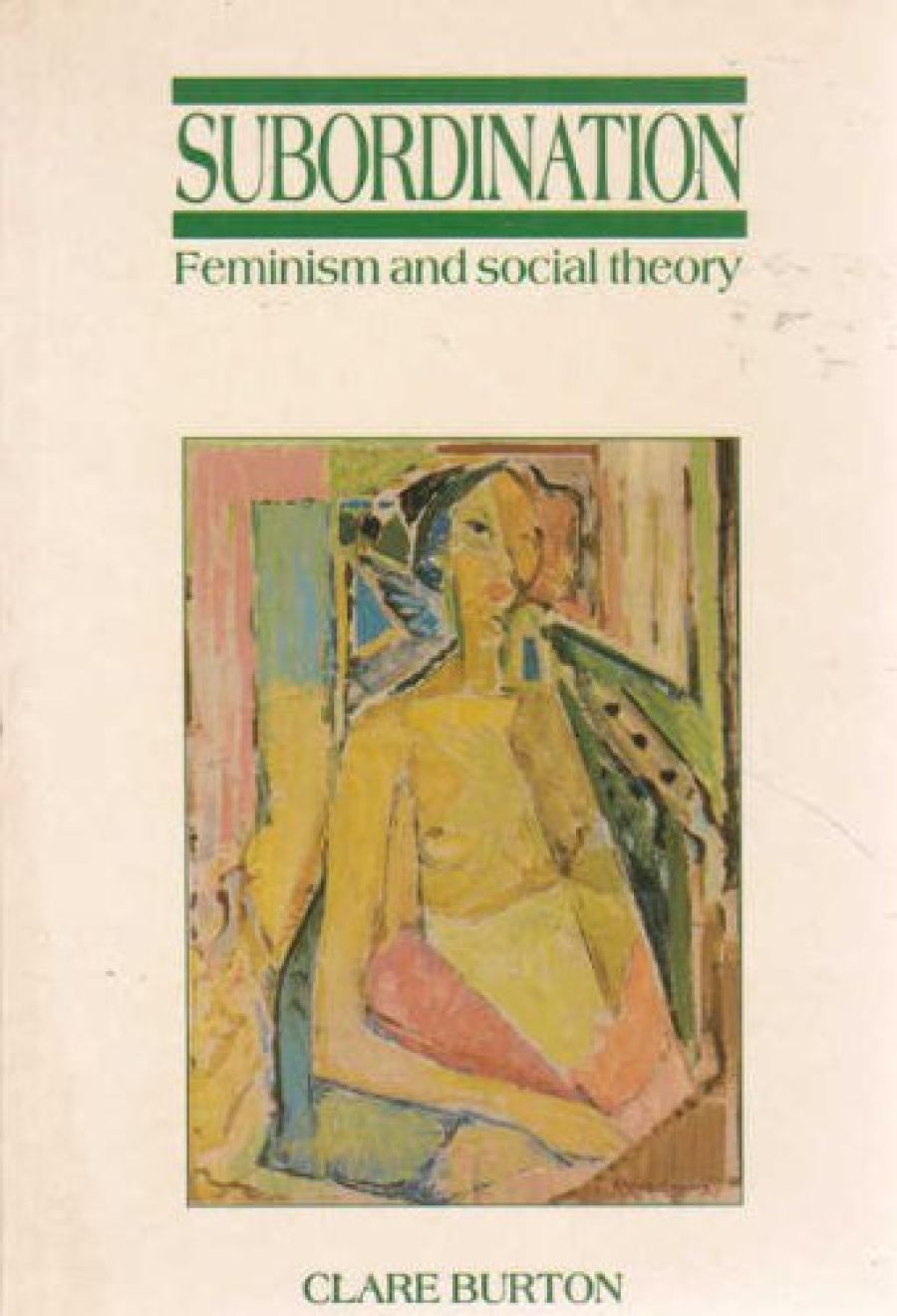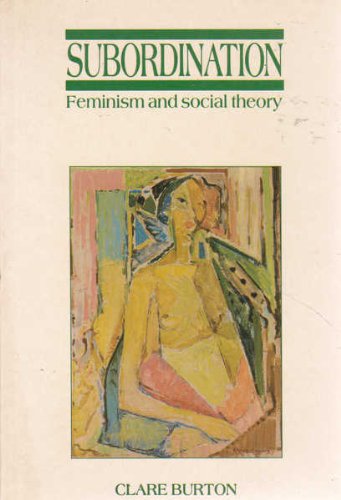
- Free Article: No
- Contents Category: Non-fiction
- Review Article: Yes
- Article Title: Marxist and Feminist Theory: The struggle of gender and class
- Online Only: No
- Custom Highlight Text:
There are three subtypes in the rapidly growing genre of ‘feminist social theory books’. One is the book which talks about ‘women and’ or ‘women in’ a specific area - the ‘herstory’ book designed to fill in gaps left in his official accounts of society. There were lots of these in the early seventies, but they’re getting rarer now as it becomes clear that we need a whole new narrative rather than a story with patches of interest to women it. Another type is the book of theory per se, which sets out to depict and explain genderbased inequality. There are many of these, from. a variety of perspectives, and some of them have had a lasting impact on many academic disciplines and on individual lives. And finally, there are books - on the whole recent arrivals - which are concerned with collating the results of the researchers and theorists who produce types one and two. This third type introduces and explicates theoretical debates and empirical findings, and functions as a guide, gloss and summary of a particular area of scholarship.
- Book 1 Title: Subordination Feminism and Social Theory
- Book 1 Biblio: Allen & Unwin, 168p., $8.95pb
- Book 1 Cover Small (400 x 600):

- Book 1 Cover (800 x 1200):

Clare Burton’s book is basically one of this type. She aims to give an account of the ideas of one group of theorists - Marxist feminists - in one period of time - the 1970s. This is a useful aim. As she points out, the literature she is concerned with is sophisticated, rapidly growing, and ‘a maze’ for the newcomer. Stock-takes and inventories of theory are handy for students and general readers alike. They may also help the growth of theory by pointing to areas of deficiency and allowing a general tidy-up of ideas and concepts. There is a recent stock-take of radical feminist literature, Hester Eisenstein’s Contemporary Feminist Thought already published by Unwin, and Subordination functions as a companion volume.
But the book aims to be more than a stock-take. Like the empiricists who struggle to rescue ‘her’ story and the theorists who try to explain why it is his word which is law, history, economics and most other forms of power, the stocktakers are working with the hope of contributing to change. Burton’s implied aim, mentioned in the preface and at the conclusion, is to improve the quality of Marxist-feminist theorising. If we want to change the world, we must interpret it correctly. And it is this second aim which, by itself, justifies the book’s existence, even though it is not in the end, fulfilled.
As a simple stock-take of theory, there is much of interest in the book. Burton takes some key debates in the literature she surveys, briskly describes a variety of positions, usually with a critical evaluation, and shows how the debates relate to each other.
Her starting point is the question about the origins of female subordination and masculine power and privilege - a good place to start both logically and chronologically since it is Engel’s work which underlies so much recent Marxist-feminist thought. Burton argues, convincingly I think, that the question of origins is one which will never be satisfactorily answered, and moves on to her main theme - a series of discussions about the varying connections between classbased and gender-based power. She looks at the literature on property and subordination, at the notions of ‘public’ and ‘private’ and how they have been employed in feminist theory, at the rather dreary and ultimately inconclusive debate on how to conceptualise domestic labour under capitalism, and at the psychoanalytic theories of Mitchell and Lacan, which explore the construction of femininity. The final chapter tries to extend previous explanations of the social reproduction of inequality by looking at the role played by the agencies of the state, especially the educational ones.
Throughout the discussion of other people’s theories, Burton insists on the need for subtlety. Theory which works, she says, must take into account the variations in social formations, over time and space. So she draws on anthropological data to argue that women in non-capitalist societies are not necessarily oppressed, and that the theory of patriarchy as a universal structure is incorrect. Similarly, she argues that there is no basis for the claim made for instance by Ortner, that women everywhere are the symbolically devalued ‘other’.
Such claims she says are the result of ethnocentric perceptions, and lead to ahistorical static theories which assume that women are passive victims of social pressures and mechanisms. Theory must also take into account the tenacity and ingenuity of human agency, without losing sight of the fact that not all agents are equally powerful - a point which is made convincingly in the discussion of the ‘reproduction’ theory of education.
And theories about oppression based on gender, Burton argues, cannot be seen as separate from theories about class. Her conclusion about these two undeniably tricky concepts is that ‘gender and class are so inextricably linked that neither assumes a primary or determining place’. Given that this is her conclusion, there is a curious omission of discussion of what has been called the ‘unhappy marriage’ of Marxism and feminism in any direct terms. Conceptualising class and patriarchy is something which Burton approaches sideways through debates on particular issues rather than head-on. To be fair though, the bulk of the ‘unhappy marriage’ literature was produced in the early ‘eighties rather than in the ‘seventies, and so falls outside the scope of the book. Similarly, Nancy Chodorow’s path-breaking work in the reproduction of femininity is not discussed in the text - a fact which the author notes regretfully in the preface.
There is no doubt that the book fulfills its first aim - although the material is presented so briskly in places that readers totally unfamiliar with the relevant literature might find it a difficult guide to follow. The second aim, the one about changing the world, is less fulfilled. At the end of the book, there is little sense of a new theory emerging. ‘We have, after all, known for some time now that under capitalism, class and patriarchy go together like the proverbial love and marriage - and are just as troublesome. What we need to know is the nature of the inextricable links between them, and how they function under different conditions. Similarly, we have known for a while that we need a way of thinking about the sources of inequality which does not deny the strength of people’s actions, but which also recognises the mighty forces of social structure and the way they constrain and shape those individual actions. The problem is - what is the way of thinking which can do all that? This book summarises debates and offers constructive comment, but does not move very far towards a new theory.
And in the end, it is not able to offer very much for practical politics either. There is a discussion of the implications of the theories discussed for action in the world, but it occupies only four out of over a hundred pages of text - an almost inevitable outcome of the demands of the PhD format. (This is a ‘book of the thesis.’) The thing which is fascinating about these recommendations is that they are very similar to those which would be made by a radical feminist who believed in the universality of patriarchy. They centre around the necessity of restructuring work and domesticity in such a way that men are institutionally bound up with the care of children, as equal partners with women. This is almost exactly the point made by the radical feminists who have focussed on motherhood and completely neglected the impact of class on women’s lives. And it seems an excellent idea. The question is - where do we start? Once again, this book does not provide an answer. Given the magnitude of the problem, it is probably unfair to ask that it should. Maybe what is needed is a fourth type of feminist social theory book - a do-it-ourselves guide to the new society? To the typewriters sisters!


Comments powered by CComment